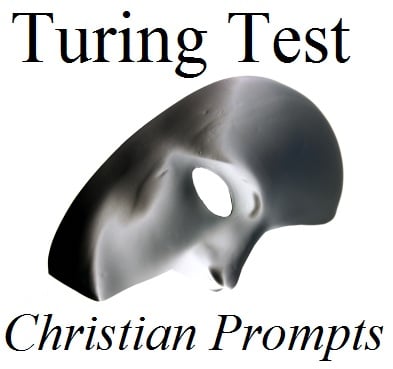This is the eighth entry in the Christian round of the 2013 Ideological Turing Test. This year, atheists and Christians responded to questions about sex, death, and literature.
Polyamory
Marriage, at its core, is limited solely to the union of two persons. I don’t know very much about civil marriage, but I can attest that natural marriage is dictated according to natural law and oriented toward the building of the family. Because it cannot exist without the complementary natures of man and woman exhibited in a mother and a father, the definition of natural marriage cannot be altered. Its purpose is to maintain the family unit—mother, father, and children—which acts as the building block and microcosm of society. Sacramental marriage transcends natural marriage, and is a more complicated topic than natural marriage. Natural marriage can be easily acknowledged by many/most people (see below), while sacramental marriage is much more difficult to explain without a particular metaphysical basis.
The idea of the family unit as the building block of society has been around for millennia; Aristotle himself is the one who suggested it as the “microcosm of society” and Confucius (who I sometimes call “Chinese Aristotle”) came to the same conclusion. The nuclear family is vital for the subsistence of society as we know it. This fact, combined with the biological oxytocin bonding which is a consequence of having sex, has led to the world of monogamous relationships as we know it.
These truths—the statistics on the necessity of two (and no more than two!) parents for the well-being of children, the fact of oxytocin bonding, the long philosophical tradition of the family as the building block of society—should be easily acknowledged by everyone but with the modern tendency to base marriage on love rather than on values (the decision is based on a friendship of interest rather than a friendship of virtue), the facts are often left by the wayside.
Euthanasia
This question is a little tricky because of its phrasing. For the purpose of the answer, I assume the question pertains to medical euthanasia and not a matter of self-defense.
It is never obligatory or permissible to actively end a life. Life ends on its own. In the event of an ethical dilemma such as a coma patient in a vegetative state, all reasonable routes must be taken to restore her to a non-vegetative state. In any and all cases involving human life, compassion trumps utility.
Active euthanasia—purposely intervening in order to kill—is never acceptable. Passive euthanasia—allowing someone to die—is acceptable in extraordinary circumstances where the detriments of the treatment far outweigh the potential benefits. If, for instance, a patient is very clearly terminally ill and the potential treatments cause great suffering and do not make any progress on the “healing” front, the treatment may be discontinued so that the patient may die in peace. This cannot be done without the permission of the patient, however, whether at the time of discontinuation or beforehand in a declaration of intention. Under no circumstances, however, is regular treatment of a dying patient to be discontinued; they must still be fed, clothed, bathed, and loved because a dying person is still a person.
Bonus
Fairy-tale style myth. Hands-down. To quote G.K. Chesterton (twice): “Fairy tales are more than true, not because they tell us that dragons exist, but because they tell us that dragons can be beaten.” And, in the same breath, “The world will never starve for want of wonders, but for want of wonder.” To marvel at the beauty of the world around me and still be surprised by it every time—that is a specialty of my perspective on the world and I think it would be best presented in a faerie story. I’d like to open it with a line from Warehouse 13: “Welcome to a world of endless wonder.”
I suspect my story would look a bit like the Lord of the Rings, though with a darker twist—somewhat like J.R.R. Tolkien meets Neil Gaiman. I’d like to say it would read like Good Omens but sadly I’m just not as funny as Terry Pratchett. However, I do think God has a fantastic sense of humour, so maybe the story which tells my worldview is kind of like Good Omens meets the Lord of the Rings.
You can vote on whether you think these answers were written by a Christian or an Atheist here. Comments are open to discuss the substance of the post and for speculation about the true beliefs of the author, so please vote before looking at the comments.












